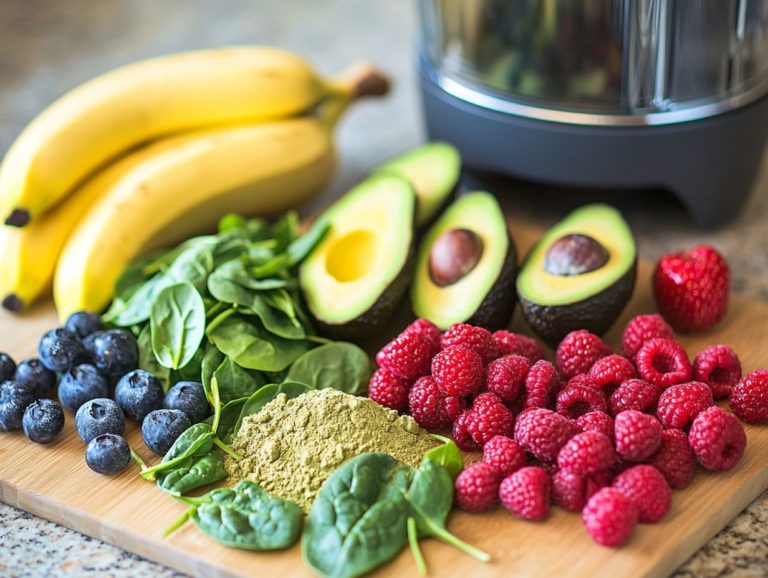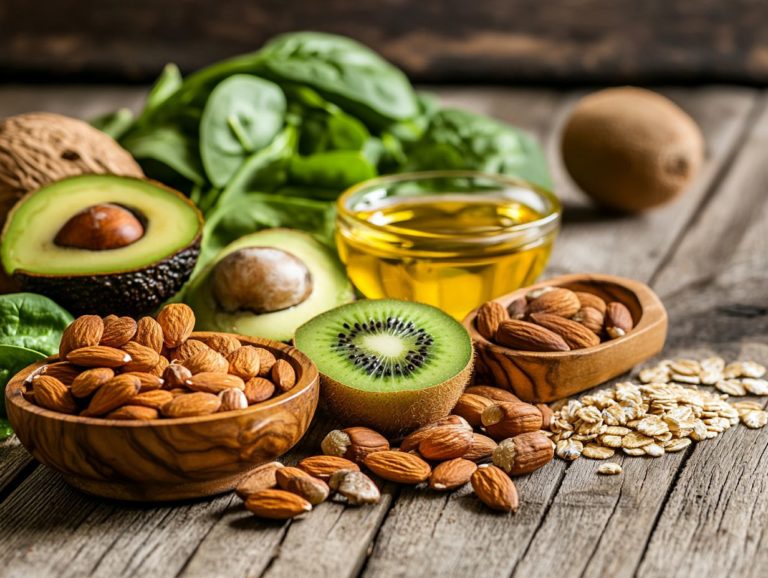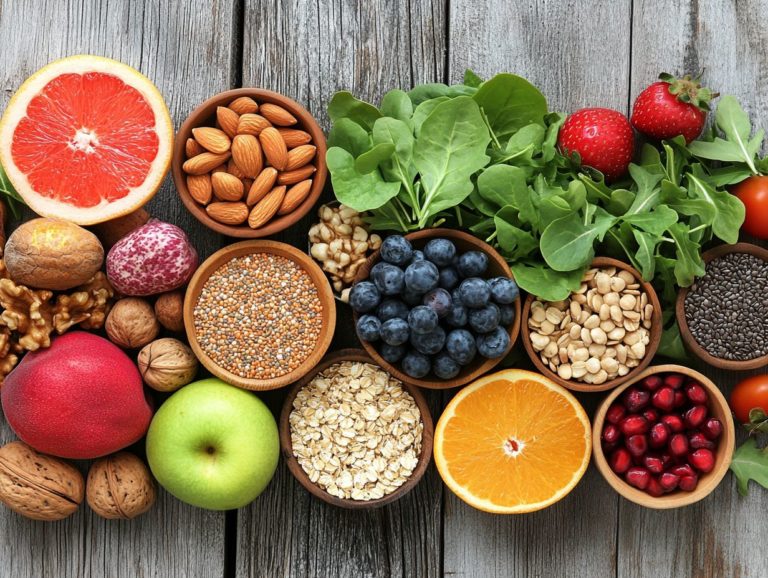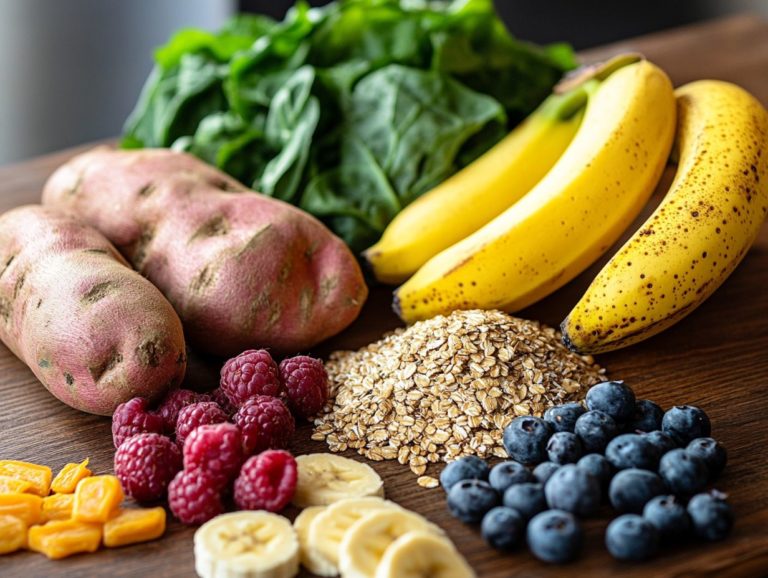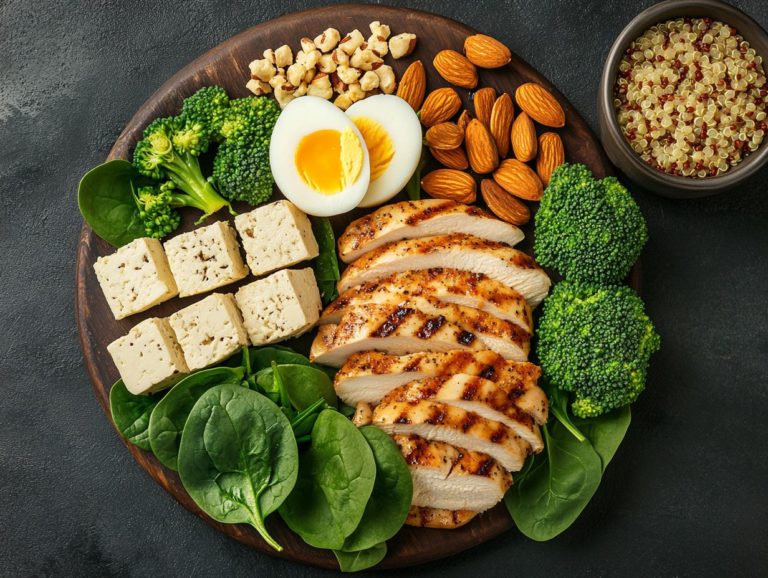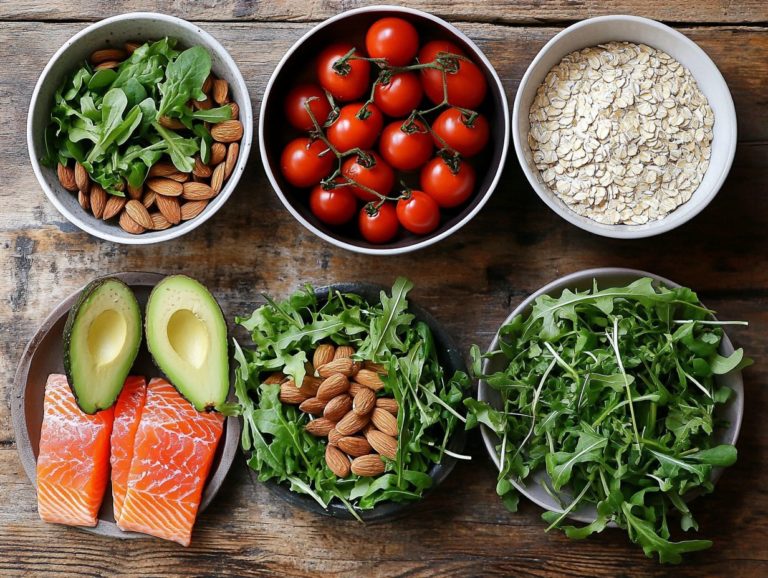5 Foods to Help You Get Enough Vitamin A
Vitamin A has many benefits. Make sure to include enough in your diet. This article delves into five delicious foods rich in vitamin A, explaining why this vitamin is crucial and outlining symptoms of deficiency.
You ll also find valuable tips for incorporating these foods into your meals, along with important insights on the risks of overconsumption. Get ready to elevate your health with these tasty choices!
Contents
- Key Takeaways:
- 1. Carrots
- 2. Sweet Potatoes
- 3. Spinach
- 4. Apricots
- 5. Red Bell Peppers
- What Is Vitamin A and Why Is It Important for Our Health?
- Frequently Asked Questions
- What are the top 5 foods to help you get enough vitamin A?
- How does vitamin A benefit your health?
- Can I get enough vitamin A from supplements instead of food?
- Are there any risks associated with consuming too much Vitamin A?
- Can I get enough Vitamin A if I follow a vegetarian or vegan diet?
- Are there foods I should avoid while trying to increase my Vitamin A intake?
Key Takeaways:
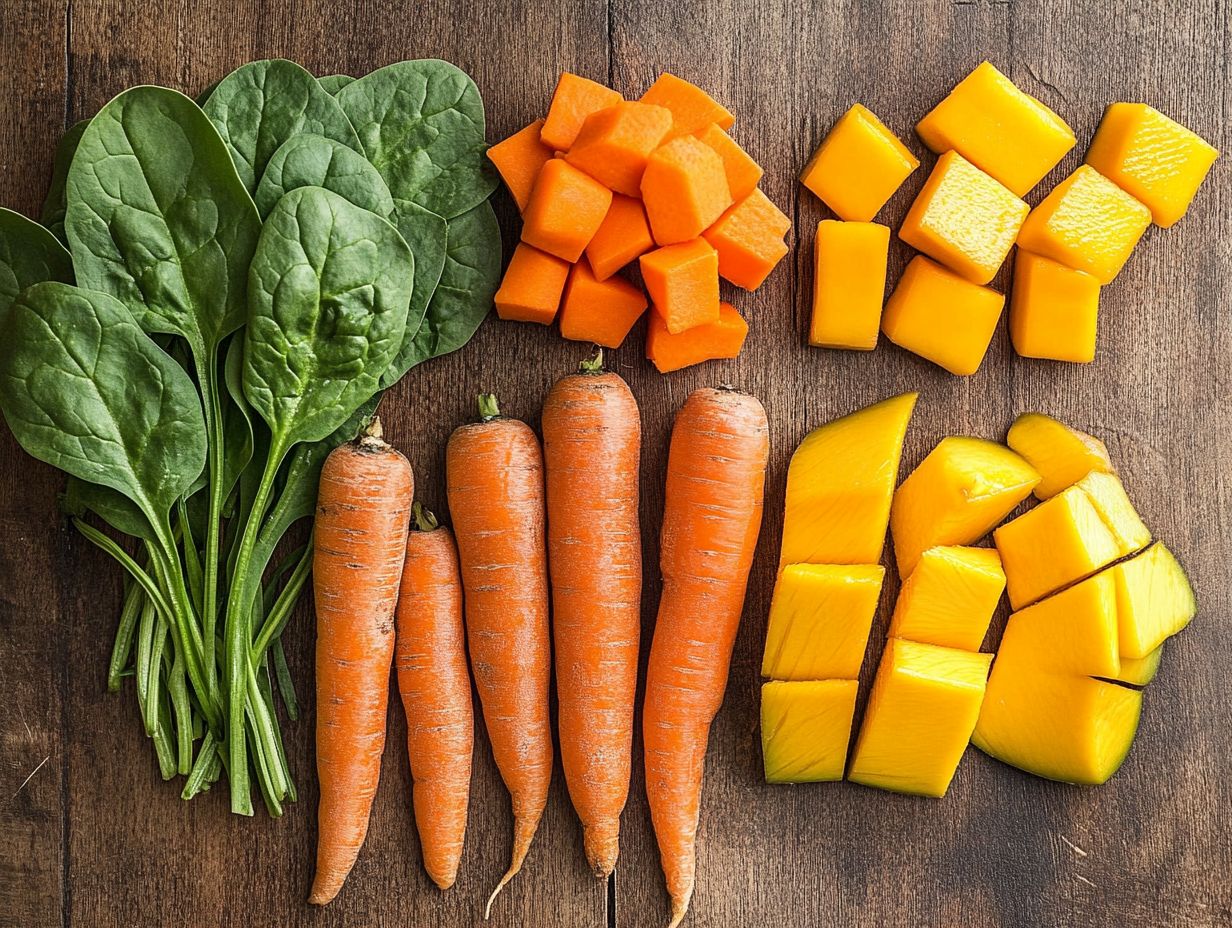
Eating carrots and sweet potatoes, which are rich in beta-carotene, helps our bodies produce vitamin A. Leafy greens like spinach and fruits like apricots are also great sources. Adding red bell peppers can provide a tasty, vitamin A-packed boost.
1. Carrots
Carrots are not just a culinary delight; they are packed with essential nutrients, especially vitamin A in the form of beta-carotene. This nutrient is vital for eye health and preventing visual impairment.
Carrots also play a significant role in nutrient absorption and support your immune system. Their rich antioxidant properties can help combat oxidative stress, making them a valuable addition to any balanced diet.
Furthermore, this nutrient-dense vegetable aids in absorbing other fat-soluble vitamins like D, E, and K. The antioxidants in carrots help reduce the risk of certain cancers, including lung and colorectal cancers, by neutralizing harmful free radicals.
To fully harness the benefits of vitamin A, consider incorporating other dietary sources like:
- Sweet potatoes
- Leafy greens
- Liver
Combining these foods works wonders for your health! This simple root vegetable offers an incredible boost, making it a staple for anyone looking to improve their diet.
2. Sweet Potatoes
Sweet potatoes are a rich source of beta-carotene, which your body converts into vitamin A. This makes them an outstanding choice for promoting overall health and addressing deficiencies.
This essential nutrient helps maintain healthy vision, skin, and cellular function. Sweet potatoes are brimming with antioxidants that combat oxidative stress and strengthen your immune system.
By boosting your immune health, enjoying sweet potatoes can enhance your ability to ward off illnesses. Research suggests that the antioxidants in this vibrant root vegetable may aid in cancer prevention, particularly for lung and prostate cancers, by reducing inflammation and inhibiting harmful cell growth.
3. Spinach
Spinach is a nutrient-dense leafy green loaded with vitamin A, primarily in the form of retinol, which is essential for your health.
This powerful vitamin enhances vision, aids in forming pigments in the retina, and improves both night vision and overall eye function. Additionally, spinach supports your body s ability to absorb nutrients, ensuring you maximize the vitamins and minerals from other foods.
The antioxidants in spinach also promote cognitive health, potentially reducing the risk of cognitive decline as you age. By adding this leafy green to your meals, you can enjoy a delightful way to boost your overall well-being and safeguard your long-term health.
4. Apricots
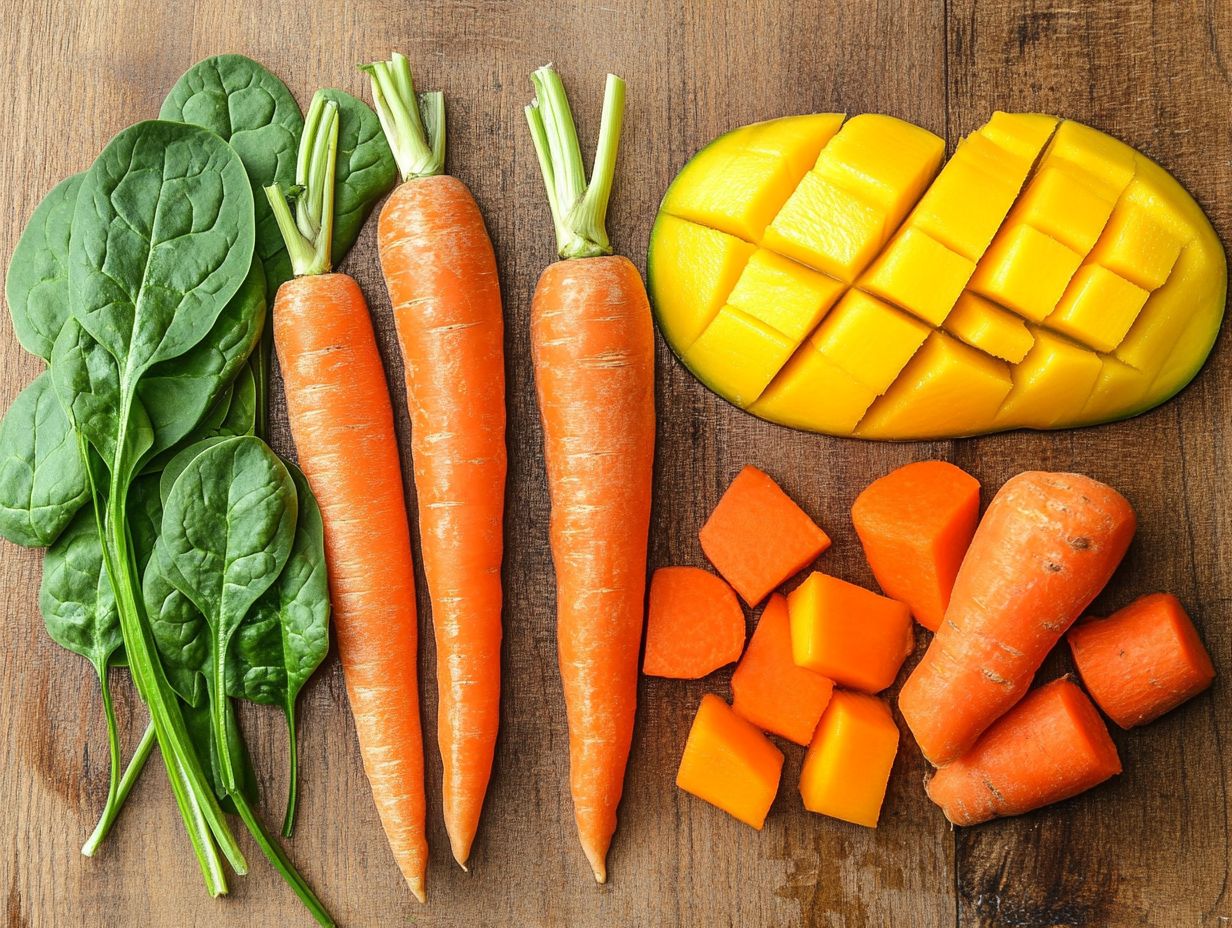
Apricots are not just small, delightful fruits; they are nutrient powerhouses packed with beta-carotene. They offer a delicious way to elevate your vitamin A intake while savoring their natural sweetness.
This vibrant fruit is beneficial for your eye health. It converts beta-carotene into vitamin A, essential for good vision and preventing age-related degeneration.
Apricots also boost your immune function. Their antioxidants fight harmful effects from free radicals and enhance overall well-being.
Incorporate these juicy gems into your diet with ease. Enjoy them fresh, dried, or in salads, smoothies, and desserts.
By doing so, you can enrich your nutrient intake while indulging in the delightful flavor of apricots.
5. Red Bell Peppers
Red bell peppers are a feast for the eyes and bursting with flavor. They are packed with vitamin A, mainly from carotenoids.
These antioxidants are crucial for sharp vision, a strong immune system, and healthy skin. Carotenoids like beta-carotene and lutein neutralize harmful free radicals in your body.
Without this protection, you risk cellular damage and chronic diseases, including cancer. Including red bell peppers in your diet is a delicious way to enhance your health.
Their high vitamin A content supports vital body functions, improving your overall vitality.
What Is Vitamin A and Why Is It Important for Our Health?
Vitamin A is a fat-soluble vitamin that plays a vital role in vision, immune function, and cellular communication. It is one of the most essential nutrients for your health.
This nutrient has two primary forms: retinol from animal products and beta-carotene from colorful fruits and vegetables. A deficiency can lead to serious health issues, including visual impairment and respiratory infections.
Vitamin A is necessary for forming rhodopsin, a pigment in the retina that enables sight in low light. It also supports mucosal surfaces and immune cell development, helping you fend off infections.
Research suggests it may protect against certain cancers, emphasizing the need for adequate intake for cellular health.
What Are the Symptoms of Vitamin A Deficiency?
Vitamin A deficiency can show up as night blindness and other visual impairments. This highlights the vitamin’s importance for retinal health.
It doesn t stop with eyesight. A deficiency can weaken your immune system, making you more vulnerable to infections.
Studies also link deficiencies to memory problems and challenges with learning. This issue spans globally; the World Health Organization estimates that around 250 million children face vitamin A deficiency.
Adults can also be affected, underscoring the widespread nature of this public health concern.
How Much Vitamin A Do We Need Daily?
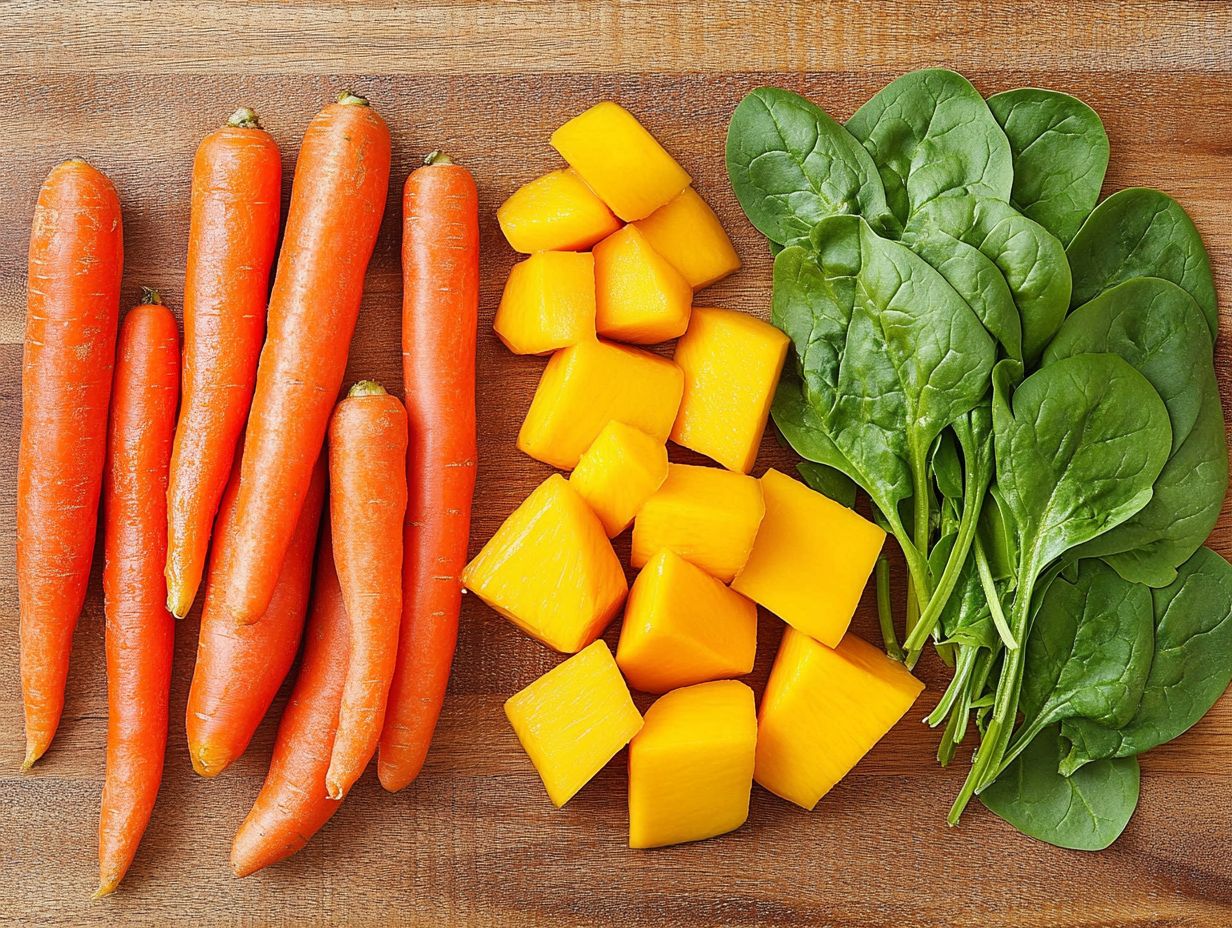
The recommended intake of vitamin A varies based on age, sex, and life stage. Health professionals can guide you to meet dietary reference values for optimal health.
For instance, if you have a child aged 1-3 years, aim for about 300 micrograms daily. As an adult man, you may need around 900 micrograms. If you’re pregnant, your requirements increase to about 770 micrograms to support fetal development.
Keep in mind that factors like existing health conditions, such as malabsorption syndromes, can influence your specific needs. Foods like liver, fish, and colorful fruits and veggies are essential for maintaining adequate levels of this vital nutrient, underscoring the importance of a well-rounded diet for everyone.
What Are Some Other Sources of Vitamin A?
Beyond carrots and leafy greens, you ll find a wealth of dietary sources providing vitamin A.
Animal products like beef liver and dairy, along with fortified foods, significantly boost your nutrient intake across various diets. Fish, particularly salmon and tuna, are also excellent contributors of this essential nutrient.
On the plant side, vibrant fruits like mangoes and apricots, plus vegetables such as sweet potatoes and pumpkins, are outstanding sources of compounds that turn into vitamin A in your body. These foods play a crucial role in maintaining good vision, bolstering immune function, and promoting healthy skin.
Food fortification plays a key role in tackling vitamin A deficiencies, especially in vulnerable populations. By adding vitamin A to everyday staples like oils or cereals, communities can greatly boost their overall nutrient intake, reducing the risks associated with vitamin deficiencies.
How Can We Incorporate These Foods into Our Diet?
Incorporating foods rich in vitamin A into your diet can be both effortless and delightful, enhancing your nutrient absorption while allowing you to savor a variety of flavors and textures.
One of the simplest and most effective strategies is to add vibrant vegetables such as carrots, sweet potatoes, and kale to your everyday dishes. Imagine whipping up a hearty vegetable stew or a colorful salad; these meals can effortlessly elevate your vitamin A levels. Consider blending fruits like mangoes and apricots into your breakfast smoothies or enjoying them as snacks it’s an enjoyable way to boost your intake.
These nutrient-rich foods not only offer essential vitamins but also bring a delightful array of tastes to your table. Remember, whole foods like carrots and sweet potatoes are safe and healthy options compared to supplements. It’s important to maintain a balanced approach by combining different sources of vitamin A, including animal-based options like liver and dairy, with plant-based choices to reap optimal health benefits.
Are There Any Risks Associated with Consuming Too Much Vitamin A?
While vitamin A is vital for health, taking too much especially through supplements can lead to vitamin A toxicity, introducing various health risks and complications into your life.
This condition can reveal itself through symptoms like nausea, dizziness, and potentially more serious issues like liver damage and vision problems.
The safe upper limit for adult intake is generally set at around 3,000 micrograms, yet many individuals unknowingly surpass this threshold. Overconsumption often occurs due to the widespread popularity of vitamin-packed supplements, which can inadvertently push you over the edge when combined with dietary sources rich in this nutrient.
It’s essential to remember that while whole foods like carrots and sweet potatoes offer significant health benefits, they rarely carry the same risk for toxicity as concentrated supplements.
Frequently Asked Questions
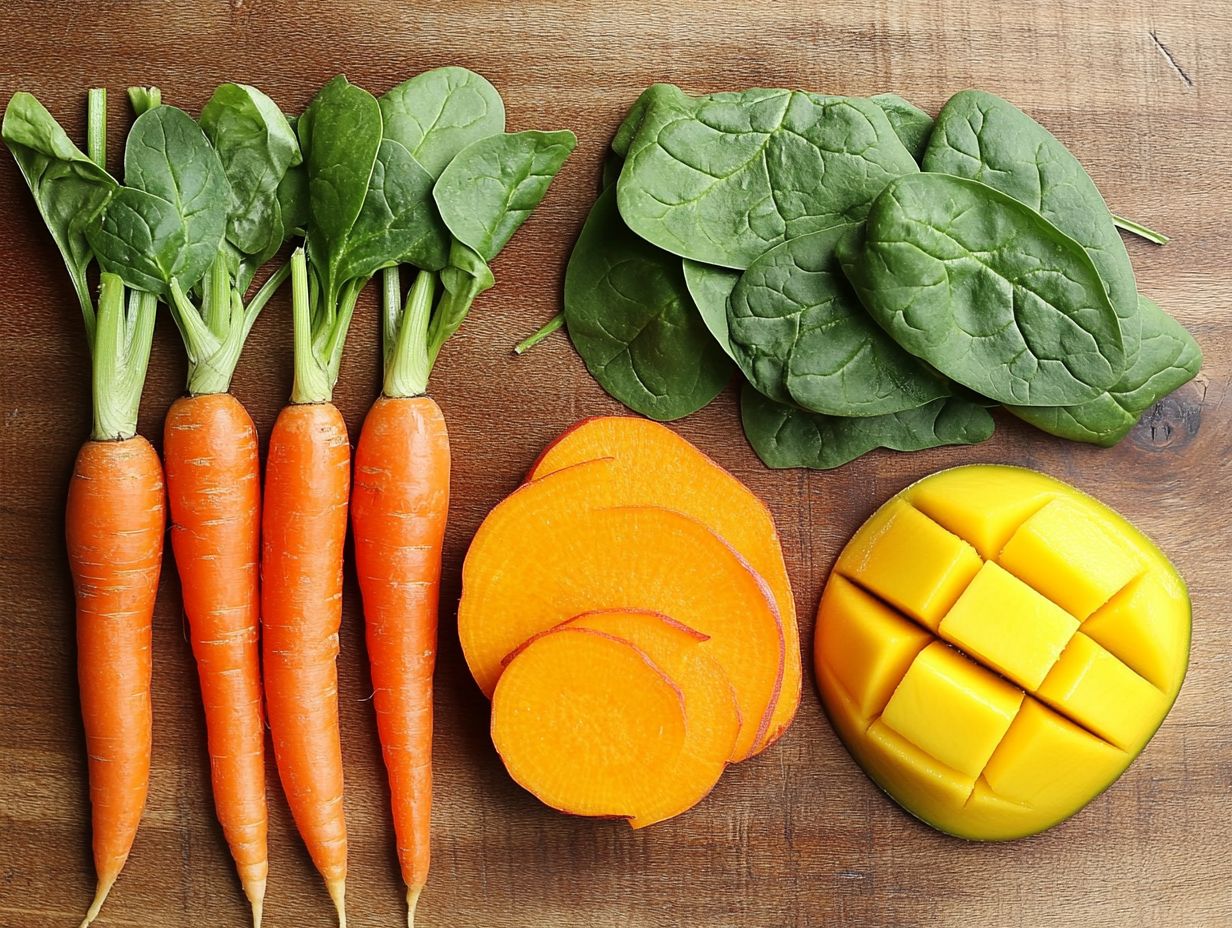
What are the top 5 foods to help you get enough vitamin A?
The top 5 foods to help you get enough vitamin A are carrots, sweet potatoes, spinach, cantaloupe, and eggs.
How does vitamin A benefit your health?
Vitamin A is important for maintaining healthy eyes, skin, and immune system. It also helps with bone growth and reproduction.
Can I get enough vitamin A from supplements instead of food?
While supplements can be helpful, it is best to get vitamin A from natural food sources as they also provide other important nutrients and fiber. Plus, too much vitamin A from supplements can be harmful.
Are there any risks associated with consuming too much Vitamin A?
Yes, too much Vitamin A can lead to toxicity. This may cause nausea, headaches, and liver damage.
Can I get enough Vitamin A if I follow a vegetarian or vegan diet?
Absolutely! There are many plant-based sources of Vitamin A, like sweet potatoes, spinach, and cantaloupe.
If you’re strict about your vegan diet, consult a healthcare professional. They can help ensure you re meeting your daily Vitamin A needs.
Are there foods I should avoid while trying to increase my Vitamin A intake?
Yes, avoid foods that are high in fat or heavily processed. These can reduce how well your body absorbs Vitamin A.
Limit alcohol too, as it can interfere with Vitamin A metabolism.

